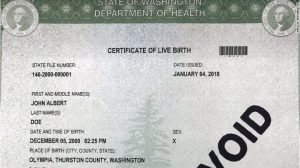Last week, the Washington State Department of Health released a new rule that adds a 3rd non-binary gender marker to birth certificates. I sat down with TRANSform WA Project Director and WA SAFE Alliance Coordinator, Jeremiah Allen, to learn more about the change.
(Katelen Kellogg): What does this new change mean for transgender and non-binary people?
(Jeremiah Allen): This change expands the options for gender markers and recognizes Washingtonians who identify as non-binary in an impactful and meaningful way.
This change does not just effect people who identify as non-binary. This also clarifies the rulemaking process for anyone who wants to change the gender marker on their birth certificates—whether to the non-binary “X”, or to male or female.
This action also changed the requirements for changing one’s gender marker:
- Adults will no longer need a physician’s note, which will significantly reduce the barriers that people face in this process, especially people in rural and remote places, or who are low-income. Instead, adults will just need to fill out an application and have their signature notarized.
- Minors will now only need notes from a licensed health care professional and a parent or guardian. The list of licensed health care professionals who can attest to the gender change has been expanded.
Fortunately, the amended birth certificate will be a clean birth certificate, meaning you will not be able to tell that it was changed. In other states, it is common practice to place an x through the original entry, but this can increase the likelihood of being outted or targeted for this change.
(KK): How did this change happen? What was the process leading up to it?
(JA): The Department of Health (DOH) had been receiving a growing number of requests about having other options for sex designation, and wanted to add rules to improve their processes.
We were initially notified of the rule creation process in early fall 2017, when the DOH opened it to public comment.
During the comment period, people were able to email, show up to comment, and send in postcards to the DOH in support of this rule creation. Pride Foundation along with Washington SAFE Alliance hosted several community conversations to discuss this topic in King County, Clark County, Kittitas County, Kitsap County, and Spokane County.
What we heard in those spaces across the board is that people are happy about this move. They are in agreement that, while the process changes could be better, this step forward needed to happen. Even at the formal public hearing, most of the comments were supportive.
(KK): Is this good news?
(JA): Yes! This is great news and a really positive first step.
We recognize, however, that the notary requirement could still present barriers for many transgender and non-binary adults—especially those living in rural areas, low-income people, and those who are incarcerated. It also implies that someone has access to a notary public who is supportive and willing to sign. There are many instances of other documents—driver licenses, for example—where a person’s signature is legally binding.
(KK): What does this mean for the future?
(JA): Our hope is that other departments that are responsible for systems and processes that include gender markers will follow suit—the Department of Labor, the Department of Transportation, etc.
While people will hear this news and be happy—and they should be—there could be some potential challenges associated with this change if the DOH is the only department to make this change in their rulemaking process:
- It could complicate gender-specific benefits like WIC.
- It could make it difficult to get a passport, or other federal documents that have gender markers.
- It could mean that a person’s ID or Driver License does not match their birth certificate.
All of us at the SAFE Alliance and Pride Foundation are still seeing this as a good step, but only if the necessary education is done so that people understand this change cannot happen in a vacuum—that it needs to be the beginning and, if it’s not, people’s lives could be negatively impacted.
Also, this isn’t just about rulemaking on paper—we must ensure that providers and government officials have the training necessary to know what to do with this information. For example, if parent registers their non-binary child for school who has the new ‘X’ gender marker, school officials must have training in order to be competent and respectful throughout the process.
(KK): What can people do to help increase public awareness about these critical next steps?
(JA): Here are a few ideas:
- Read the complete rule to stay informed
- Request trainings around transgender and non-binary identities by contacting me by email or calling me at 206.323.3318
- Keep an eye on the Washington SAFE Alliance & Pride Foundation Facebook Pages for further resources, like a Know Your Rights pamphlet that will be coming soon
Katelen Kellogg is Pride Foundation’s Communications and Outreach Manager. Jeremiah Allen is Project Director at TRANSform Washington.
